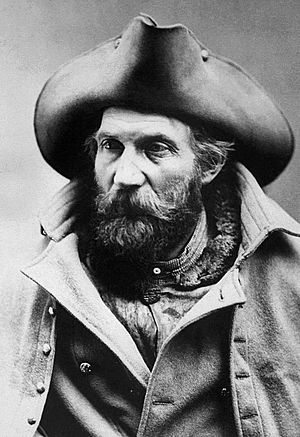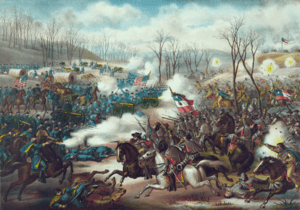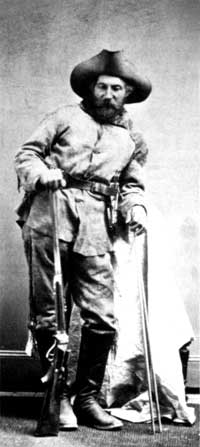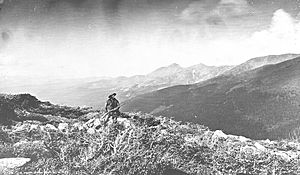Harry Yount facts for kids
Quick facts for kids
Harry Yount
|
|
|---|---|

Yount in 1873
|
|
| Nickname(s) | Rocky Mountain Harry Yount |
| Born | March 18, 1839 (likely) Washington County, Missouri, US (likely) |
| Died | May 16, 1924 (aged 85) Wheatland, Wyoming, US |
| Buried |
Lakeview Cemetery, Cheyenne, Wyoming
|
| Allegiance | United States |
| Service/ |
Union Army |
| Years of service | 1861–65 |
| Rank | Company quartermaster sergeant |
| Unit | 8th Regiment Missouri Volunteer Cavalry |
| Battles/wars | American Civil War |
| Relations | George C. Yount (uncle) |
| Other work |
|
Henry S. Yount (March 18, 1839 – May 16, 1924) was an American soldier, mountain man, and professional hunter. He also worked as a prospector, wilderness guide, and packer. He is best known as the very first game warden in Yellowstone National Park. People often called him "Rocky Mountain Harry Yount."
Yount fought in the American Civil War for the Union Army. After the war, he worked as a hunter and guide. He helped map the Rocky Mountains for seven years. In 1880, he became the first gamekeeper for Yellowstone National Park. He worked there for 14 months. His reports helped shape how national parks protect their wildlife. Later, the National Park Service was created. Its second director, Horace Albright, called Yount the "father of the ranger service."
Contents
Early Life and Family Connections
Harry Yount's family came to America from Europe in the 1700s. His parents were David and Catherine Yount. Harry was their tenth child.
His uncle, George C. Yount, was a famous trapper and explorer. George Yount moved to California before Harry was born. He was the first American to settle in Napa Valley, which was then part of Mexico. The town of Yountville, California, is named after him.
There are different ideas about when and where Harry Yount was born. Records from his time in the Army and the 1840 United States Census suggest he was born on March 18, 1839. These records also show his full name was Henry S. Yount. His nickname was "Harry." He was likely born in Harmony Township, Washington County, Missouri. This is a rural area southwest of St. Louis.
Serving in the Civil War

Harry Yount joined the Union Army in November 1861. He served for six months. In March 1862, he was hurt and captured by the Confederate Army. This happened just before the Battle of Pea Ridge in Arkansas. He was held as a POW for almost a month. He was released in a prisoner exchange.
He joined the Army again in August 1862. He served until the war ended in July 1865. He was promoted three times. By the end of the war, he was a company quartermaster sergeant.
Because of his time as a prisoner, Yount developed rheumatism in his feet. This caused pain and stiffness. Later in life, he received a small monthly pension for his disability. He was also an active member of the Grand Army of the Republic. This was a group for Union Army veterans.
Life as a Hunter and Guide
After the Civil War, Yount planned to marry Estella Braun. Sadly, she died in a train accident before their wedding. Yount never married.
He traveled to Fort Kearny in Nebraska. There, he worked as a "bullwhacker" for the U.S. Army. This meant he drove wagons pulled by oxen, carrying supplies. He traveled along the Bozeman Trail in what is now Wyoming and Montana. During this time, he sometimes faced conflicts with Native Americans. He understood that they were defending their land.
Yount also hunted buffalo. He sold buffalo tongues to tourists. He believed that killing buffalo was sad, but it was seen as a way to clear the land for settlers.
In the early 1870s, the Smithsonian Institution hired Yount. He collected animal specimens for their museum displays. He was very good at this job.
A writer named Ernest Ingersoll wrote about Yount in a magazine in 1877. Ingersoll described Yount as a very skilled hunter. He also said that Yount was a "gentleman" with a "tender heart." Yount cared about the animals he hunted. He also paid a Shoshone woman to decorate his buckskin jacket.
Exploring with the Hayden Survey
Around 1872, Yount began working as a guide for geological survey teams. These teams were mapping large areas of the Rocky Mountains. The Hayden Survey, led by Ferdinand Vandeveer Hayden, was one of these groups. It was funded by the United States Department of the Interior. Hayden had helped create Yellowstone National Park in 1872.
Yount worked for Hayden's expeditions every summer for seven years. They explored areas in what are now New Mexico, Arizona, Utah, Wyoming, and Colorado. In the winters, Yount would hunt and trap in Wyoming.
In 1874, Yount had a close call with a large grizzly bear. He had to shoot the bear several times to stop it.
In 1877, Yount went mountaineering with Ingersoll and a mapmaker named A. D. Wilson. They were the first to climb the south slopes of Wind River Peak. Yount and Wilson were also the first to climb West Atlantic Peak.
In 1878, Yount guided a group trying to climb the Grand Teton. This mountain was very hard to climb. Yount slipped on ice and almost fell into a deep crack in the glacier. He held on tightly. Yount and Wilson had to turn back close to the top. No one had ever gotten so close to the summit before. The first successful climb of the Grand Teton happened 20 years later.
Yellowstone's First Gamekeeper
In 1880, Harry Yount was hired as the first gamekeeper for Yellowstone National Park. He earned $1,000 a year. The park's total budget was only $15,000. He was hired by Carl Schurz, the Secretary of the Interior. Yount started his job in July 1880.
He chose a spot to build a winter camp. This spot helped protect herds of buffalo and elk from poachers. Poachers are people who hunt animals illegally.
Yount wrote two reports about his work. He sent them to the Secretary of the Interior. In his first report, he suggested that the park needed a "small, active, reliable police force." This force would protect animals, guide-boards, and the park's natural wonders.
In his second report, Yount described the very harsh winter of 1880–1881. He explained how he tried to stop poaching. He also hunted to feed the park staff. He resigned from his job in this report. He said that one person could not protect the whole park. He again suggested a small, reliable police force. This force would protect animals, prevent forest fires, and enforce park rules. Yount may have disagreed with the park superintendent, who wanted him to build roads instead of focusing on wildlife protection.
The First Park Ranger
Even though Yount's job title was "gamekeeper," he is seen as the first "park ranger." He only worked in Yellowstone for 14 months. But his ideas had a big impact on how national parks are managed in the United States.
Horace Albright, who became the second director of the National Park Service, wrote about Yount. He said that Yount realized one person couldn't patrol the whole park. Yount pushed for a ranger force. Because of this, Harry Yount is called the "father of the ranger service."
Later Years and Legacy
After leaving Yellowstone, Yount lived in Wyoming. He spent almost 40 years looking for valuable minerals like copper and graphite in the Laramie Mountains. He also worked on a marble mining claim.
Yount was still prospecting the day before he died. On May 16, 1924, he collapsed and died of heart failure in Wheatland, Wyoming. He was buried in Lakeview Cemetery in Cheyenne.
Younts Peak is a mountain in the Absaroka Range. It is 12,156 feet (3,705 meters) high. This peak is named after Harry Yount. The Hayden Geological Survey gave it this name.
In 1994, the National Park Service created the Harry Yount Award. This award is given each year to an employee. It honors someone whose work and dedication as a park ranger have made a big difference. Yount is remembered for setting high standards for park rangers today.
 | May Edward Chinn |
 | Rebecca Cole |
 | Alexa Canady |
 | Dorothy Lavinia Brown |



